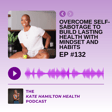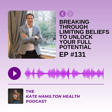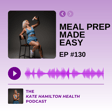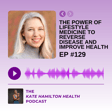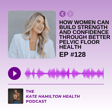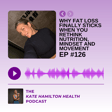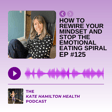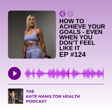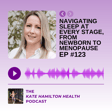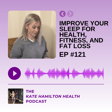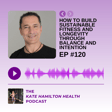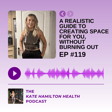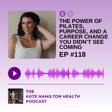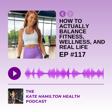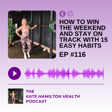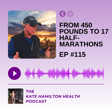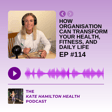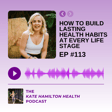
#112: The KHH Curriculum: Your guide to a lasting healthy lifestyle
Are you struggling to build a sustainable healthy lifestyle?
In this solo episode of The Kate Hamilton Health Podcast, I chat about the biggest obstacles to lasting wellness and I share my step-by-step coaching framework for transformation.
I talk about the impact of societal pressures, the importance of deconstructing unhealthy habits, and introduce my 11-step health coaching curriculum - a practical guide to building a lifestyle that supports your long-term health goals.
From meal planning and resistance training to mindset shifts and habit automation, I cover the essential strategies for simplifying your routine and making real, lasting progress. If you’ve ever felt overwhelmed by conflicting health advice or struggled to maintain consistency, this episode is your roadmap to cutting through the noise and taking actionable steps toward a healthier you.
Episode Breakdown:
[00:00] – Introduction to the solo episode
[01:18] – How the obesity narrative influences our health choices
[02:12] – The lifestyle epidemic: Understanding what’s holding you back
[03:26] – How to deconstruct and simplify your daily routine
[05:45] – The power of self-reflection in health transformation
[06:50] – A deep dive into The Kate Hamilton Health Coaching Curriculum
[07:56] – The 3-step strategy: Eliminate, delegate, and automate for success
[13:27] – Setting goals and creating a roadmap for daily progress
[16:55] – Food quality: Why nutrient-dense meals matter more than fad diets
[19:28] – How to start tracking your food for better results
[20:17] – Using calorie calculators and tracking tools effectively
[20:54] – The secret to planning ahead and avoiding last-minute temptations
[23:51] – Why daily movement is key to long-term health
[24:56] – Sleep optimization: How rest impacts weight loss and recovery
[26:36] – Hydration hacks: Simple ways to improve energy and focus
[28:28] – Balancing macronutrients for steady progress
[29:27] – Resistance training: The game-changer for metabolism and strength
[32:57] – The key to consistency and long-term success
[35:20] – Final thoughts and how to work with Kate
Links & Resources:
If you enjoyed this episode, please subscribe, leave a review, and share it with friends who might benefit. For more health and fitness tips, follow me on Instagram and TikTok @katehamiltonhealth.
Music b LiQWYD Free download: hypeddit.com/link/xxtopb [http://hypeddit.com/link/xxtopb] Promoted by FreeMusicPromo [https://www.youtube.com/channel/UCbycji-eySnM3WD8mbxPUSQ] / @freemusicpromo
